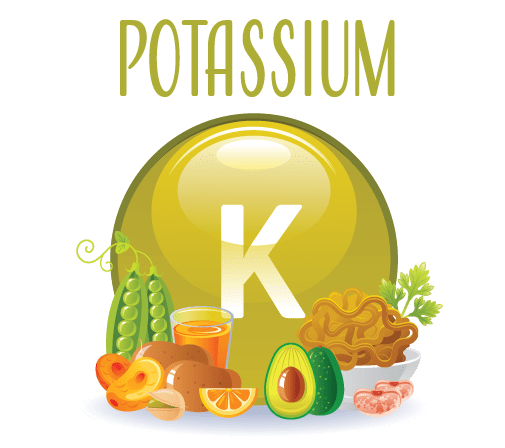
The Importance of Potassium for Human Health
Potassium is an often-overlooked mineral that is essential for the proper functioning of the human body. It is involved in a multitude of functions, including hormone secretion, maintaining healthy nerve function, and regular heart rhythm. Potassium is an electrolyte, which means that it carries an electrical charge that helps regulate the flow of fluids in and out of cells.
As we age, our potassium levels tend to decline, which can lead to a variety of health issues. For example, low levels can cause muscle weakness, fatigue, and irregular heart rhythms. Therefore, it is important to include potassium-rich foods in your daily diet, such as bananas, avocados, sweet potatoes, tomatoes, and spinach.
For the body to utilize potassium, it needs to be consumed through the diet in adequate amounts. Potassium is an essential mineral required for various vital bodily functions, including muscle contractions, nerve impulses, and heart function. Once consumed, potassium is absorbed in the small intestine and transported throughout the body via the bloodstream. The kidneys play a crucial role in regulating potassium levels by excreting excess amounts in urine and conserving it when levels are low. Thus, the proper functioning of the kidneys is also necessary for the utilization of potassium. Additionally, it works in conjunction with sodium to regulate fluid balance in cells and maintain blood pressure. Therefore, a balanced intake of both potassium-rich and low-sodium foods can help optimize utilization, leading to improved health outcomes.
Why is Potassium is essential for our body?

Water
Fluid balance is maintained when we consume and excrete fluids. Potassium controls water movement across cell membranes to regulate fluid balance. Low potassium leads to sodium retention and water retention, swelling, and high blood pressure. High potassium increases urine output to remove excess fluids, reducing swelling and blood pressure.

Celluar Action
This mineral that is essential for chemical reactions and is crucial for the proper functioning of our nerves and muscles. It is also important in regulating the transfer of nutrients through the cell membrane.
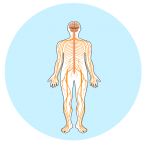
Nervous System
Vital for bodily functions such as regulating heart rhythm, controlling muscle contractions, and fluid balance. It acts as an electrolyte and aids in creating a voltage gradient necessary for electrical signal transmission between cells. Potassium also collaborates with sodium ions to maintain the body’s balanced electrical system. Without adequate potassium levels, these functions can be disrupted, causing adverse health effects.
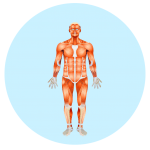
Muscular System
One of its main functions is aiding in the proper transmission of electrical chemical impulses throughout the body. This is particularly important in the nervous system, where these impulses help to regulate everything from heart rate to muscle movements.
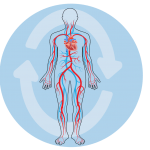
Circulatory System
It helps to regulate blood pressure by promoting the excretion of excess sodium from the body. Potassium also acts as a vasodilator, which means it helps to relax the walls of blood vessels, allowing blood to flow more freely.
Studies have shown that a diet rich in potassium can help to reduce the risk of cardiovascular disease. It can lower blood pressure, reduce the risk of stroke, and improve heart health. It also helps to regulate the heartbeat, which is essential for maintaining a healthy circulatory system.
Symptoms of POtassium deficiency

Water
When there is a deficiency in the body, it can cause a buildup of sodium, which can lead to excessive thirst and salt retention. Additionally it plays a crucial role in regulating fluid balance in the body, and a deficiency can cause edema or water retention. It helps regulate the body’s sweat production, and when there is a deficiency, the body may produce more sweat than necessary.

Cognitive Issues
A deficiency can lead to cognitive impairment, such as poor memory and decreased concentration. It has also been linked to depression and nervousness, which may be due to its role in regulating brain chemistry. Furthermore, low potassium levels can cause chills and shivers as it affects muscle function.

Bowel Movement
Diarrhea occurs when the body eliminates waste too quickly, resulting in frequent, loose bowel movements. Inadequate potassium levels, coupled with dehydration, can worsen diarrhea symptoms, leading to muscle weakness, fatigue, and electrolyte imbalance.

Dry Skin
One of the most notable signs of a deficiency in potassium is the development of abnormally dry skin and acne.
Skin serves as a protective barrier for our body, and its health depends on various factors, including having a balanced diet. Low potassium levels often lead to dehydration, which can cause skin dryness and flakiness. Acne may also develop due to the inadequate supply of this mineral, leading to inflammation and breakouts.

Blood Sugar
Potassium also plays an essential role in the regulation of glucose in the blood. Glucose intolerance can be traced back to a deficiency of potassium in the body. When the body has low levels of potassium, it may cause the cells to become insulin resistant, which leads to an increase in blood sugar levels.

Muscular System
Muscular fatigue and weakness are the most common symptoms of potassium deficiency. When the potassium level in the body drops below the required level, muscles become weak, and fatigue sets in quickly. This condition is commonly known as Hypokalemia, which weakens the muscles, including the heart muscle, leading to an abnormal heartbeat, palpitations, and increased risk of heart failure.

NAusea
A deficiency can cause an electrolyte imbalance that affects the function of the digestive system. This can lead to a feeling of nausea and the urge to vomit. Potassium is necessary for proper muscle function, including the muscles in the digestive system that push food along and control contractions.
Headache

Anyone experiencing persistent headaches should consider the role of potassium in their diet. Potassium-rich foods such as bananas, avocados, sweet potatoes, and spinach should be included in one’s diet to ensure adequate potassium intake.

Heart Issues
When there is a potassium deficiency, it can cause fluctuations in heartbeats which can lead to an irregular heartbeat and even heart failure in some cases. Low level can also lead to high cholesterol and low blood pressure, both of which can have negative effects on overall health.
Conditions that increase fluid loss beyond normal as in vomiting, diarrhea, and medications like diuretics can lead to a deficiency.
Symptoms of potassium deficiency can be similarly mistaken for other medical issues, so a blood test can be used to confirm a deficiency. An appropriate diet and supplementation can quickly correct a potassium deficiency, preventing the occurrence of debilitating headaches or more serious complications. It is essential to prioritize the right balance of potassium in the diet to promote overall health and to prevent the onset of periodic headaches.
Needed to Utilization
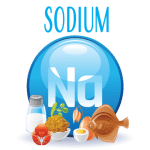
Sodium and potassium are interconnected but have opposite effects in the bod. Both play a key role in balance.

